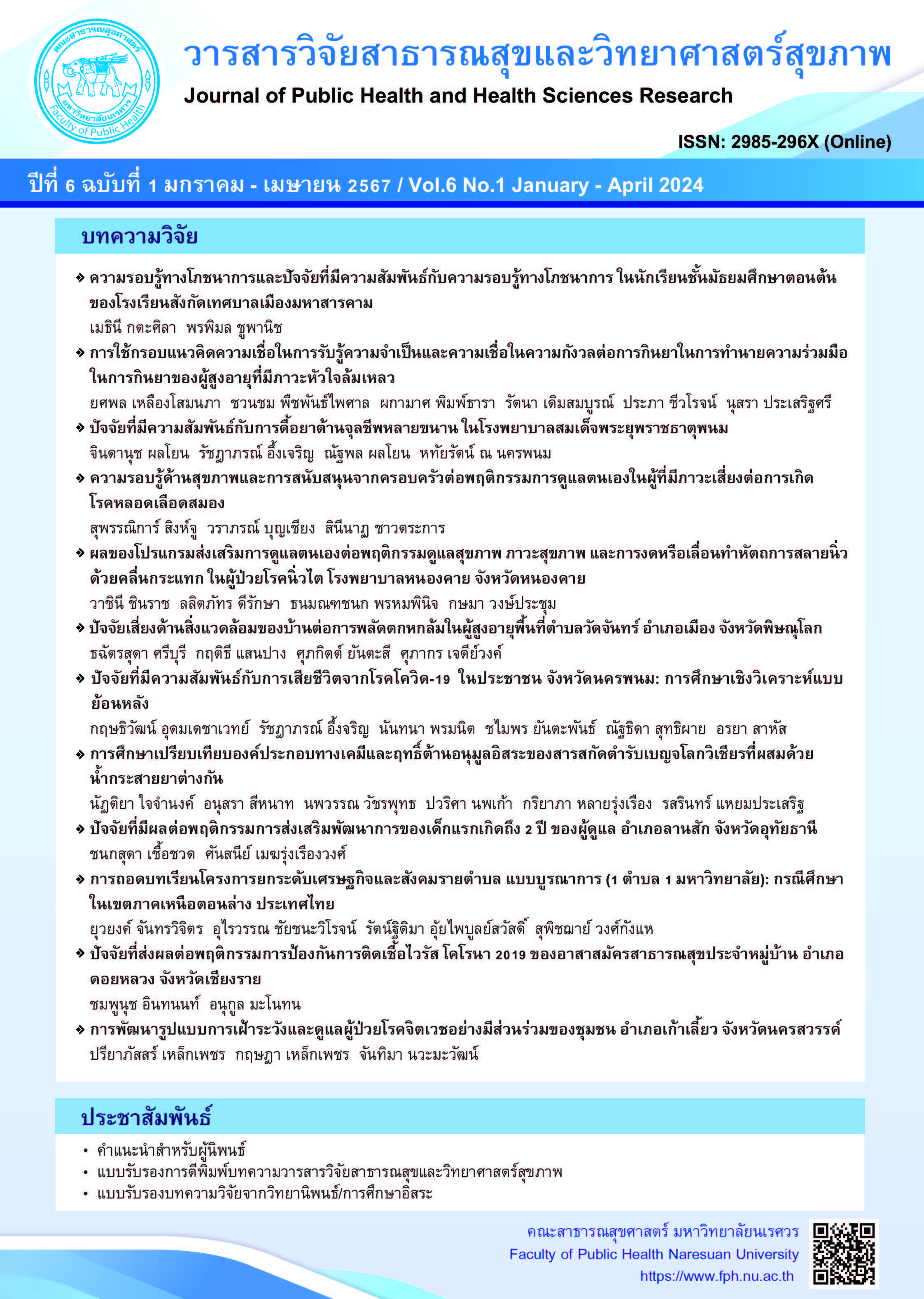การใช้กรอบแนวคิดความเชื่อในการรับรู้ความจำเป็นและความเชื่อในความกังวลต่อ การกินยาในการทำนายความร่วมมือในการกินยาของผู้สูงอายุที่มีภาวะหัวใจล้มเหลว
คำสำคัญ:
กรอบแนวคิดความเชื่อในการรับรู้ความจำเป็นและความกังวลต่อการกินยา, ความเชื่อเกี่ยวกับการกินยา, ความร่วมมือในการกินยา, ผู้สูงอายุ, หัวใจล้มเหลวบทคัดย่อ
การวิจัยเชิงวิเคราะห์ภาคตัดขวางนี้ มีวัตถุประสงค์เพื่อศึกษาอำนาจทำนายของตัวแปรตามกรอบแนวคิดความเชื่อในการรับรู้ความจำเป็นและความเชื่อในความกังวลต่อการกินยา ที่มีต่อความร่วมมือในการกินยาของผู้สูงอายุที่มีภาวะหัวใจล้มเหลว กลุ่มตัวอย่างเป็นผู้สูงอายุ 60-79 ปี ได้รับการวินิจฉัยภาวะหัวใจล้มเหลวและเคยรับบริการแผนกผู้ป่วยนอก โรงพยาบาลพระปกเกล้า จังหวัดจันทบุรี จำนวน 107 ราย สุ่มตัวอย่างแบบมีระบบจากรายชื่อกลุ่มตัวอย่าง เครื่องมือวิจัย ได้แก่ แบบสอบถามความเชื่อในการรับรู้ความจำเป็นต่อการกินยาและความเชื่อในความกังวลตอ่ การกินยามีคา่ ความเชื่อมั่น 0.91 และ 0.81 ตามลำดับ และแบบสอบถามความรว่ มมือในการกินยามีค่าความเชื่อมั่น 0.90 รวบรวมข้อมูลด้วยวิธีการสอบถามผ่านทางโทรศัพท์ ในระหว่างเดือนกันยายน ถึง ธันวาคม พ.ศ. 2565 วิเคราะห์ข้อมูลด้วยสถิติพรรณนาและการวิเคราะห์ถดถอยโลจิสติกเชิงพหุ
ผลการศึกษา พบว่า กลุ่มตัวอย่างส่วนใหญ่ร่วมมือในการกินยาระดับมาก (ร้อยละ 86.9) ความเชื่อในการรับรู้ความจำเป็นต่อการกินยา (AOR = 1.30; 95% CI = 1.01-1.67) และความเชื่อในความกังวลต่อการกินยา (AOR = 0.76; 95% CI = 0.62-0.92) สามารถร่วมกันทำนายความร่วมมือในการกินยาได้ ร้อยละ 17.8 ดังนั้น พยาบาลหรือบุคลากรทางการแพทย์ที่ให้การรักษาผู้สูงอายุที่มีภาวะหัวใจล้มเหลวควรประเมินความเชื่อในการรับรู้ความจำเป็นต่อการกินยาและความเชื่อในความกังวลต่อการกินยาในกลุ่มผู้ที่ร่วมมือในการกินยาน้อยและให้ความรู้ในรายที่มีความเชื่อที่ไม่ถูกต้อง เพื่อเพิ่มโอกาสเกิดความร่วมมือในการกินยาในระดับมากต่อไป
References
Amininasab, S. S., Lolaty, H. A., Moosazadeh, M., & Shafipour, V. (2022). Medication adherence and its predictors among patients with heart failure. Nursing and Midwifery Studies, 19, 81-86.
Bai, H.-H., Nie, X.-J., Chen, X.-L., Liang, N.-J., Peng, L.-R., & Yao, Y.-Q. (2022). Beliefs about medication and their association with adherence in Chinese patients with nondialysis chronic kidney disease stages 3-5. Medicine, 10(2), 1-8.
Bozkurt, B., Coats, A. J. S., Tsutsui, H., Abdelhamid, C. M., Adamopoulos, S., et al. (2021). Universal definition and classification of heart failure: A report of the heart failure society of America, Heart failure association of the European society of cardiology, Japanese heart failure society and writing committee of the universal definition of heart failure. European Journal of Heart Failure, 23, 352-380.
Clatworthy, J., Bowskill, R., Parham, R., Rank, T., Scott, J., & Horne, R. (2009). Understanding medication non - adherence in bipolar disorders using a necessity-concern framework. Journal of Affective Disorders, 116, 51-55.
Clyne, B., Cooper, J. A., Boland, F., Hughes, C. M., Fahey.T, & Smith, S. M. (2017). Beliefs about prescribed medication among older patients with polypharmacy: A mixed methods study in primary care. British Journal of General Practice, e507-e518.
Diez-Villanueva, P., Jimenez-Mendez, C., & Alfonso, F. (2021). Heart failure in the elderly. Journal of Geriatric Cardiology, 18(3), 219-232.
Foot, H., Caze, A. L., Gujral, G., & Cottrell, N. (2016). The necessity-concerns framework predicts adherence to medication in multiple illness conditions: A meta-analysis. Patient Education and Counseling. 99(5),706-17. doi: 10.1016/j.pec.2015.11.004.
Horne, R. (1997a). Representations of medication and treatment: Advances in theory and measurement. In K. J. Petrie & J. Weinman (Eds.), Perceptions of Health and I llness: Current Research and Applications (pp. 155-188). London: Harwood Academic.
Horne, R. (2003b). Treatment perceptions and self regulation. In L. D. Cameron & H. Leventhal (Eds.), The Self-Regulation of Health and Il lness Behavior (pp. 138-153). London: Routledge.
Horne, R., Albert, A., & Boone, C. (2018). Relationship between beliefs about medicines, adherence to treatment, and disease activity in patients with rheumatoid arthritis under subcutaneous anti-TnFα therapy. Patient Preference and Adherence, 12, 1099-1111.
Horne, R., & Weinman, J. (2002). Self-regulation and self - management in asthma: Exploring the role of illness perceptions and treatment beliefs in explaning non-adherence to preventer medication. Psychology and Health, 17(1), 17-32.
Horne, R., Weinman, J., & Hankins, M. (1999). The beliefs about medicines questionnaire: The developments and evaluation of a new method for assessing the cognitive representation of medication. Psychology and Health, 14, 1-24.
Huber, C., Kunz, M., Artelt, C., & Lautenbacher, S. (2010). Attentional and emotional mechanism of pain processing and their related factors: A structural equations approach. Pain Research and Management, 15(4), 229-237.
Leaungsomnapa, Y., Promproh, S., Leaungsomnapa, S., & Sourthao, Y. (2013). Influence of belief about medication on high group of medication adherence in hypertensive patients. Journal of Prapokklao Hospital Clinical Medical Education Center, 30(2), 146-157. (in Thai)
Leaungsomnapa, Y., Promproh, S., Leaungsomnapa, S., Thasirasawad, P., Keawchaum, R., & Suraworawathanakul, W. (2014). Confirmatory factor analysis of beliefs about medicine questionnaire in Thai version. Journal of Prapokklao Hospital Clinical Medical Education Center, 2014, 297-310. (in Thai)
McDonagh, T. A., Metra, M., Adamo, M., Gardner, R. S., Baumbach, A., Bo..hm, M., . . . Butler, J. (2021). 2021 ESC Guidelines for the diagnosis and treatment of acute and chronic heart failure. European Heart Journal, 42, 3599-3726.
Miot, H. A. (2011). Sample size in clinical and experimental trials. Jornal Vascular Brasileiro, 10(4), 275-278.
Park, H. Y., Seo, S. A., Yoo, H., & Lee, K. (2018). Medication adherence and beliefs about medication in elderly patients living alone with chronic diseases. Patient Preference and Adherence, 12, 175-181.
Ponikowski, P., Voors, A. A., Anker, S. D., Bueno, H., Cleland, J. G. F., Coats, A. J. S., Meer, P. V. D. (2016). ESC guidelines for the diagnosis and treatment of acute and chronic heart failure: the Task Force for the diagnosis and treatment of acute and chronic heart failure of the European Society of Cardiology (ESC): developed with the special contribution of the Heart Failure Association (HFA) of the ESC. European Journal of Heart Failure, 18, 891-975.
Ruangthip, T., Wattanakitkrileart, D., Charoenkitkarn, V., & Dumavibhat, C. (2017). Factors influencing medication adherence in patients with chronic heart failure. Royal Thai Navy Medical Journal, 44(3), 51-65. (in Thai)
Schuling, J., Gebben, H., Veehof, L. J., & Haaijer-Ruskamp, F. (2012). Deprescribing medication in very elderly patients with multimorbidity: the view of Dutch GPs. A qualitative study. BMC Family Practice, 13(1), 56.
Schwinger, R. (2021). Pathophysiology of heart failure. Cardiovascular Diagnosis and Therapy, 11(1), 263-276.
Silavanich, V., Nathisuwan, S., Phrommintikul, A., & Permsuwan, U. (2019). Relationship of medication adherence and quality of life among heart failure patients. Heart & lung : the journal of critical care, 48(2), 105–110.
Sipos, M., Farcas, A., Prodan, N., & Mogosan, C. (2021). Relationship between beliefs about medicines and adherence in elderly patients with cardiovascular and respiratory diseases: A cross-sectional study in Romania. Patient education and counseling, 104(4), 911–918.
Suresh, C. P., & Chandrashekara, S. (2012). Sample size estimation and power analysis for clinical research studies. Journal of Human Reproductive Sciences, 5(1), 7-13.
Umashankar, M.S. & Kumar, A.B. (2020). Heart failure. Pharmacotherapeutic Management of CVD Complications: A textbook for medical students. (pp 124-145). India: Bentham Books imprint.
Unni, E., & Bae, S. (2022). Exploring a new theoretical model to explain the behavior of medication adherence Pharmacy, 10(4), 1-10.
Van der Wal, M. H. L., & Jaarsma, T. (2008). Adherence in heart failure in the elderly: Problem and possible solutions. International Journal of Cardiology, 125, 203-208.
WHO. (2003). Towards the solution. In Adherence to Long-Term Therapies Evidence for Action (pp. 27-38). Geneva: World Health Organization.
Wu, J.-R., & Moser, D. K. (2018). Medication adherence mediates the relationship between heart failure symptoms and cardiac event-free survival in patients with Heart Failure. Journal of Cardiovascular Nursing, 33(1), 40-46.
Zhang, Z. (2016). Model building strategy for logistic regression: purposeful selection. Annals of Translational Medicine, 4(6), 1-7.
Downloads
เผยแพร่แล้ว
How to Cite
ฉบับ
บท
License
Copyright (c) 2024 วารสารวิจัยสาธารณสุขและวิทยาศาสตร์สุขภาพ

This work is licensed under a Creative Commons Attribution-NonCommercial-NoDerivatives 4.0 International License.
บทความที่ได้รับการตีพิมพ์เป็นลิขสิทธิ์ของวารสารวิจัยสาธารณสุขและวิทยาศาสตร์สุขภาพ
ข้อความที่ปรากฏในบทความแต่ละเรื่องบทความในวารสารวิชาการและวิจัยเล่มนี้เป็นความคิดเห็นส่วนตัวของผู้เขียนแต่ละท่านไม่เกี่ยวข้องกับมหาวิทยาลัยนเรศวร และคณาจารย์ท่านอื่นๆในมหาวิทยาลัยฯ ความรับผิดชอบเกี่ยวกับบทความแต่ละเรื่องผู้เขียนจะรับผิดชอบของตนเองแต่ละท่าน






